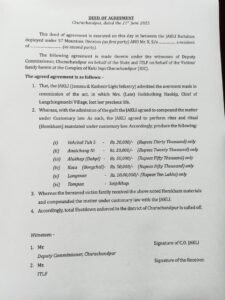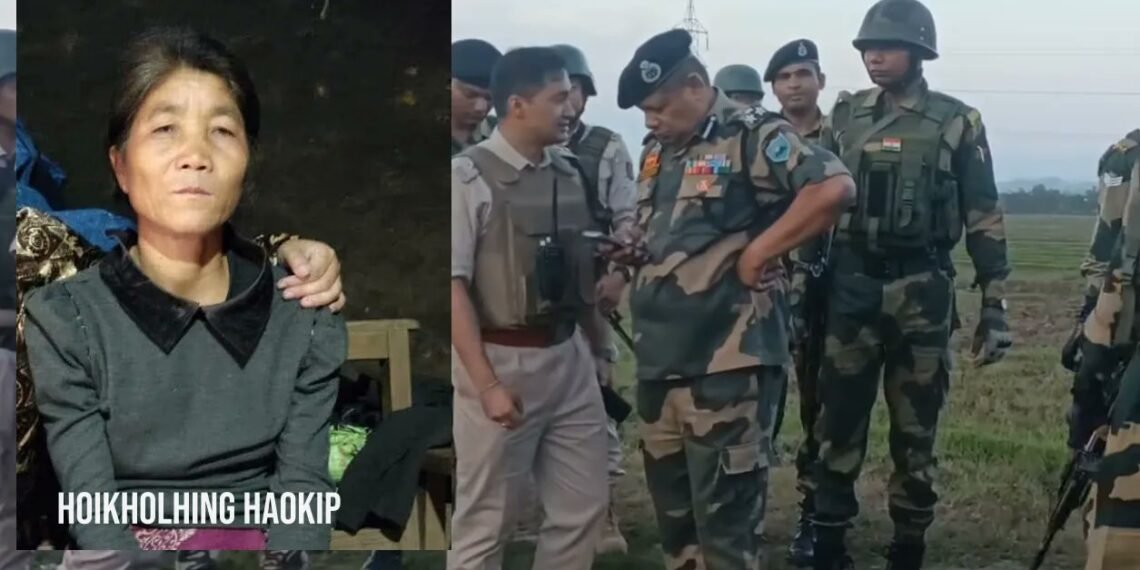The Indigenous Tribal Leaders’ Forum has lifted its indefinite shutdown in Churachandpur after reaching an agreement with JKLI and district authorities. The battalion’s acknowledgment of the “commission of the act” marks a rare instance of accountability from security forces in the state’s conflict-ridden history.
BY Navin Upadhyay
June 21, 2025–The Jammu & Kashmir Light Infantry (JKLI) battalion has virtually admitted guilt in the shooting death of Hoikholhing Haokip, a 77-year-old Kuki-Zo woman and wife of the Langchingmanbi village chief, by agreeing to pay Rs. 11 lakh as compensation to her family.
This landmark agreement, finalized today between the JKLI, the district administration, and the Indigenous Tribal Leaders’ Forum (ITLF), follows her killing on June 19, 2025, in the volatile Churachandpur-Bishnupur border region. The settlement has led the ITLF, a prominent tribal body representing the Kuki-Zo community, to lift its indefinite shutdown in the district, signaling a temporary de-escalation in the ongoing ethnic strife.
Manipur has been a tinderbox of ethnic conflict since May 2023, when clashes between the majority Meitei community and the tribal Kuki-Zo groups erupted over issues of land, affirmative action, and political representation. The violence, which has claimed over 258 lives and displaced thousands, has been marked by sporadic attacks, retaliatory strikes, and allegations of security force bias. The Churachandpur-Bishnupur border, a flashpoint due to its proximity to Kuki-Zo and Meitei territories, has seen frequent confrontations. The incident involving. Hoikholhing occurred amid this tense backdrop, triggered by a shooting in Phubala village, Bishnupur, where Meitei farmer Ningthoujam Biren was injured, in shotting by unknown gunmen. This prompted a search operation by JKLI and Manipur Police in Kuki-dominated areas like Langchingmanbi and Heichanglok on June 19.

The police initially reported that Hoikholhing was killed during a crossfire with “unknown armed men” while working in a field, framing it as an unfortunate collateral incident. However, the Kuki-Zo community swiftly rejected this narrative, alleging a deliberate act by security forces. This claim gained traction through protests, community gatherings, Civil Society organisations (CSOs) highlighting the incident as state-sponsored violence. The ITLF imposed an indefinite shutdown on June 20, demanding justice and an investigation, escalating tensions in the region.
READ: Sonia Gandhi Slams Modi Govt’s Silence on West Asia Crisis
The Agreement and Compensation
The breakthrough came today with a deed of agreement executed on June 21, 2025, mediated by the Deputy Commissioner of Churachandpur. The JKLI’s admission of the “commission of the act” leading to Hoikholhing’s death serves as a virtual acknowledgment of guilt, a rare concession by security forces in such cases. Under customary Kuki-Zo tribal law, the battalion agreed to compound the matter—a traditional process to resolve disputes and restore harmony—by providing Rs. 11 lakh in compensation, detailed as follows:
- Vochal Tuh 5: Rs. 30,000/- (Rupees Thirty Thousand only) [Vochal = pig, Tuh 5 = five pigs]
- Amitchang Ni: Rs. 20,000/- (Rupees Twenty Thousand only) [Amitchang = two eyes]
- Alukhap (Dahpi): Rs. 50,000/- (Rupees Fifty Thousand only) [Alukhap = pillow (gong)]
- Kosa (Bongcha): Rs. 50,000/- (Rupees Fifty Thousand only) [Kosa = sacrificial animal for the agreement]
- Longman: Rs. 10,00,000/- (Rupees Ten Lakhs only) [Longman = cash (penalty payment for life taken)]
( Vochal=pig; Amitchang=two eyes; Alukhap=pillow (gong); Kosa=sacrificial animal for the agreement; Longman=cash (penalty payment for life taken).
On 19th June 2025, Mrs Hoikholhing Haokip succumbed to death in the hands of security forces.
Heavy ShutDown was enforced for two days. Few hours ago, Jammu and Kashmir Light Infantry (JAKLI) has tendered an apology as per Kuki Customary Law. https://t.co/rJLX2WdzY6 pic.twitter.com/kg1n3cJFrL— Alice Ngaipilhing (@haokip_alice) June 21, 2025
These items reflect traditional restitution practices, where livestock (pigs), symbolic offerings (eyes, pillow/gong, sacrificial animal), and a substantial cash penalty address the loss of life. The family’s acceptance of the compensation paved the way for the ITLF to lift the shutdown.
In a media release, the ITLF stated, “This is to inform the general public that an amicable solution has been reached… The mortal remains of mother will be put to rest at Martyr Cemetery, Sehken.” The forum also thanked the community for their unwavering support in seeking justice.
READ: Trump for Nobel Peace? Pakistan Pitches the Irony of the Century
The JKLI’s virtual admission and compensation payment carry significant implications. Firstly, it marks a rare instance of a security force acknowledging responsibility in Manipur’s ethnic conflict, potentially setting a precedent for resolving similar disputes through customary law. This could encourage other tribal communities to pursue traditional mediation, reducing reliance on protracted legal battles. However, it also raises questions about accountability, as no criminal charges or disciplinary actions against JKLI personnel have been announced, leaving the door open for perceptions of impunity.
Secondly, the lifting of the shutdown offers temporary relief to Churachandpur’s economy and daily life, which had been paralyzed by the ITLF’s action. Shops, schools, and transport services, halted since June 20, are expected to resume, though the fragile peace remains contingent on trust in the agreement’s enforcement. The Kuki-Zo community, while welcoming the compensation, continues to demand a broader investigation into alleged security force excesses, citing past incidents like the November 2024 killing of Zosangkim Hmar in Jiribam and the June 2023 death of Domkhohoi Haokip in Kangpokpi.
Thirdly, the incident has intensified scrutiny on the role of central forces like the JKLI in Manipur. Verified X posts, such as @manipur_truth’s claim that “Kuki-Zo women are being targeted systematically,” reflect ongoing distrust.
Finally, the agreement underscores the power of tribal bodies like the ITLF in negotiating with state and central authorities. Their success in securing compensation may embolden further demands, potentially escalating tensions if unmet. The Manipur Police have registered a case under the Bharatiya Nyaya Sanhita , but with no arrests, the call for justice persists.














